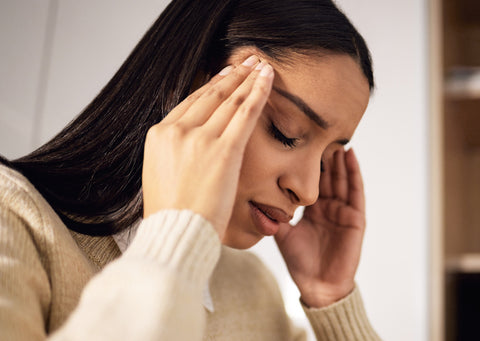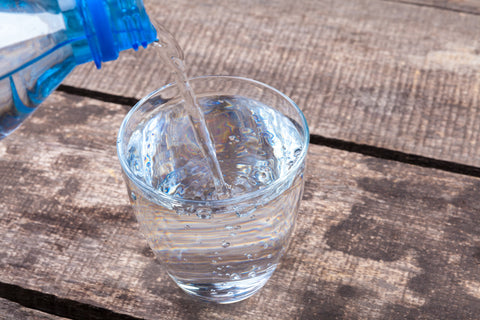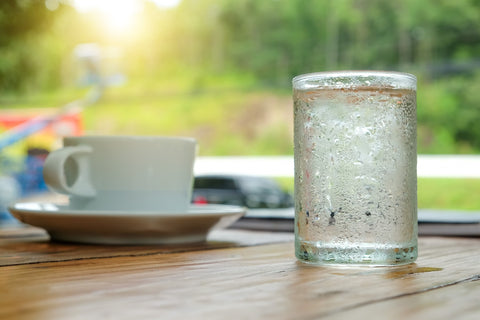Caffeine Detox: What Is It and How Do I Start?

For many of us, caffeine is the fuel that kickstarts our mornings and keeps us chugging through the day. But what if we told you that taking a break from this popular stimulant could lead to better health, improved sleep, and higher energy levels?
In this deep-dive blog post, we're going to explore the world of caffeine detoxing – what it is, why you should consider it, and most importantly, how to go about it.
Caffeine detox is a timely topic given our society's reliance on this substance – found not only in coffee but also in tea, soda, energy drinks, and some foods. If you're a health enthusiast or simply curious about how caffeine affects your body, the insights you'll gain from this post could just be the catalyst for a positive change in your lifestyle.
Let's dive in!
What Is Caffeine Detox?
A caffeine detox is a period when an individual abstains from consuming caffeine. The goal of quitting caffeine is to reduce the body's tolerance to the substance and eliminate the physiological need for it.
Effects of Caffeine on the Body
Caffeine is a central nervous system stimulant that can cause physical dependence, leading to withdrawal symptoms when intake is stopped.
Caffeine works by blocking the effects of adenosine, a brain chemical involved in sleep. This interference with the body's natural rhythms leads to increased alertness and wakefulness. In high doses, it can even produce symptoms like anxiety and rapid heart rate.

The Side Effects of Caffeine Withdrawal
When you suddenly stop consuming caffeine, your body goes into withdrawal, which can result in various symptoms such as headaches, fatigue, irritability, difficulty concentrating, and even flu-like symptoms. Depending on the individual's tolerance and consumption levels, these effects can last for a few days to weeks.
That's why we'll be prioritizing tips on how to go about a caffeine detox in the gentlest way possible!
Would I Benefit from A Caffeine Detox?
While caffeine has some benefits, including increased alertness and improved concentration, excessive consumption can have negative effects on the body.
If you're struggling with any of the following issues, a caffeine detox may be beneficial for you:
Poor Sleep Quality
As caffeine interferes with your natural sleep patterns, it can lead to difficulty falling asleep or staying asleep. This disruption of the circadian rhythm can result in feeling fatigued and unrefreshed even after a full night's rest.
Feeling Anxious or Jittery
Caffeine is known for its stimulating effects. Consequently, consuming too much of it can lead to feelings of anxiety, irritability, and even panic attacks.
Digestive Issues
Caffeine can have a laxative effect on the body, causing gastrointestinal distress such as diarrhea or stomach pains. It may also worsen symptoms for those with irritable bowel syndrome.
Dependency on Caffeine to Function
If you feel like you cannot function without consuming caffeine throughout the day, it may be a sign of physical caffeine dependence This can lead to constantly increasing your intake to feel the same effects and potentially causing long-term health issues.
Getting Started with a Caffeine Detox
If you've decided to give a caffeine detox a try, it's essential to approach it safely and gradually. Abruptly stopping caffeine consumption can cause severe withdrawal symptoms, which is why it's best to slowly decrease your intake over some time.
1. Set a Realistic Goal
Decide on the duration of your detox and stick to it. It can be anywhere from 10 days to a few weeks depending on your tolerance and consumption levels.
2. Start Slowly
“Cold turkey” detoxing is rarely successful, and in the case of caffeine, it can result in severe withdrawal symptoms that make it challenging to stick to the plan. Instead of quitting cold turkey, gradually reduce your caffeine intake by cutting back one cup or serving at a time. This process may take a few weeks, but it will be more manageable and sustainable in the long run.

3. Stay Hydrated
Caffeine is a diuretic, meaning it promotes urination and can lead to dehydration. As you cut back on caffeine, make sure to drink plenty of water throughout the day to avoid headaches and other caffeine withdrawal symptoms.
4. Replace Caffeine with Healthier Alternatives
Instead of reaching for a cup of coffee or an energy drink, try incorporating natural sources of energy into your daily routine. These can include exercising and drinking beverages that nourish your body such as herbal teas and GOOD IDEA.
When you drink GOOD IDEA before and during your meal, it's like giving your body a heads-up to reduce blood sugar spikes. Our amino acids help to prepare your body for the food that's coming, while chromium increases your insulin sensitivity.
5. Get Enough Rest
As your body adjusts to the decrease in caffeine, you may experience fatigue and difficulty sleeping. It's essential to prioritize getting enough rest during this period. Try implementing a relaxing bedtime routine and avoiding screens before bed to ensure quality sleep.
6. Seek Support
Detoxing from caffeine can be challenging, especially if you're used to relying on it for daily functioning. Seek support from friends and family or join online communities of individuals who are also going through a caffeine detox. Sharing experiences and tips can help you stay motivated and accountable.
Tips and Tricks to Get Through a Caffeine Detox
- Keep yourself busy: Take up new hobbies or activities that can keep your mind occupied and away from caffeine cravings.
- Try alternatives: There are many delicious caffeine-free options, such as herbal teas, decaf coffee and GOOD IDEA.
- Plan ahead for caffeine-free social events: Be prepared with alternative drinks to enjoy when out with friends or attending events where caffeine is typically consumed.
- Stay patient: It may take a while for your body to adjust and fully detox from caffeine, so be patient and kind to yourself throughout the process. Remind yourself of the potential health benefits and improved sleep quality that can come from a successful caffeine detox.
Managing Withdrawal Symptoms
Withdrawal symptoms from caffeine can vary from person to person, and some people may not experience any at all. However, common symptoms may include headaches, fatigue, irritability, difficulty concentrating, and mood swings.
To help manage these symptoms during a caffeine detox, do the following:
- Stay hydrated: As mentioned earlier, drinking lots of water can help flush and alleviate headaches.
- Get enough rest: Make sure to prioritize getting enough sleep and rest during the detox process.
- Exercise: Regular physical activity can help boost energy levels, improve mood, and reduce fatigue during a caffeine detox.
- Take breaks: If you feel overwhelmed or anxious during the detox, take breaks as needed. Practice deep breathing or try relaxation techniques like yoga or meditation to help ease any discomfort.

The Reward On the Other Side
While a caffeine detox might seem challenging, the benefits can be worth it. So take the plunge and give your body a break from caffeine – you never know what positive changes could be waiting for you on the other side!
Here are just a few examples below:
Physical and Mental Health Improvements
Detoxing from caffeine can lead to a reduction in anxiety, a calmer digestive system, and lower blood pressure. Mentally, you may feel sharper and less prone to the ups and downs of caffeine-induced energy crashes.
Increased Energy Levels
Paradoxically, many people report feeling more energetic after a detox and quit coffee. This is likely because, when taken habitually, caffeine can interfere with the body's natural energy production.
Enhanced Well-being
Finally, a caffeine detox may contribute to an overall sense of well-being. For some, the act of taking control of their consumption habits can be empowering, leading to a more positive outlook on health and life in general.
FAQs
Q: How long will the caffeine withdrawal symptoms last?
A: It varies for each individual and can depend on the duration and intensity of their caffeine use. Typically, symptoms such as a caffeine withdrawal headache can be on and off and vary per person.
Q: Can I still enjoy caffeine after the detox?
A: It's recommended to continue limiting your intake and using caffeine in moderation. This can help prevent dependency and avoid experiencing severe withdrawal symptoms again in the future.
Q: How long should I detox for?
A: The duration of a caffeine detox can vary depending on individual goals and tolerance. It's essential to set a realistic and achievable goal, whether it be a few weeks or a few months. Listen to your body and adjust as needed.

Q: Do I have to quit caffeine?
A: It ultimately depends on what you want to achieve with your detox and how caffeine affects your overall health. You may find that incorporating small amounts of caffeine into your diet after the detox is sustainable for you, while others may choose to eliminate it entirely.
Q: What if I detox and go right back, will I lose the benefits?
A: It's important to listen to your body and make changes that work for you. If you do decide to start drinking coffee again, try doing so in moderation.
The benefits of a caffeine detox can have lasting effects, even if you choose to drink coffee occasionally. Ultimately, the goal is to find a balance that works for your individual health and well-being.
Q: How does caffeine affect blood sugar?
A: Caffeine can cause spikes in blood sugar levels, which may be a concern for individuals with diabetes or insulin resistance. A caffeine detox, along with healthier replacements can help regulate blood sugar levels and potentially improve insulin sensitivity.
Conclusion
The decision to detox from caffeine is a personal one, but the potential benefits are worth considering. Whether you're looking to improve your health, sleep better, or just reduce your reliance on stimulants, the information in this post can help guide you through the process.
Remember, the key to a successful detox is understanding the impact of caffeine on your body and making a plan that works for you. Take it one step at a time, and be kind to yourself as you transition to a caffeine-free lifestyle!



